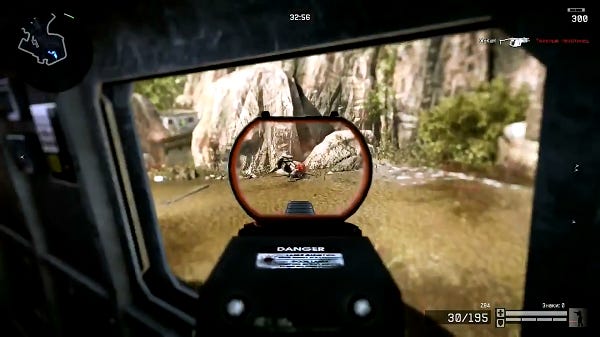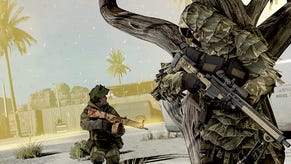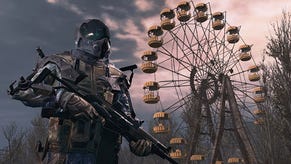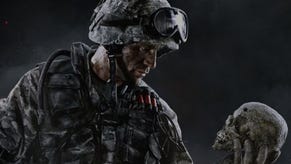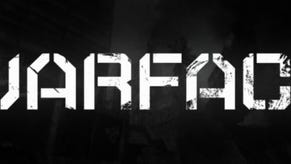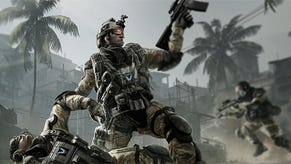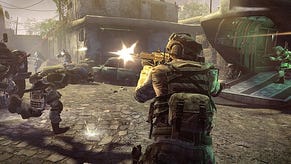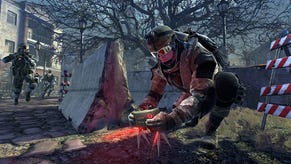Face To Face With Crytek: Warface Interview
Staring Into The Face Of War
Is it unfashionable to be cynical about free-to-play these days?* I'm a bit of a stick in the mud when it comes to this stuff. I don't like the idea that game design, balance and content are all elements of a game that can and should be fiddled with depending on how many little chunks of money a player throws at the developer. I also think that the some examples of microtransactions are at best poor value, and at worst deeply exploitative. I'm open minded though. Especially open minded when the free-to-play game in question has got very shiny graphics, and lets you shoot robots. I sat down with Crytek's Michael Krach & Michael Khaimzon at GDC to find out more about their upcoming Microtransaction based game, Warface, and it seems as though they saw me coming.
RPS: First thing I need to ask is: Where did the name Warface come from?
Khaimzon: It was his idea. At the same time we were developing the Gface platform for games, I think the word "Face" was rotating around his head extensively. You know, when it comes to finding names for games, there are many funny stories, I'm not sure I should even tell them.
Krach: Probably not.
Khaimzon: But you'd be surprised at how important people think this is, and how easily sometimes the name comes up. We have all the fucking teams coming from marketing trying to come up with a good name, then somebody brainfarts some word during a meeting, and that's what the game is called. Every time it's different
Krach: For me, it raises eyebrows. For the first seconds you're like "Really?", but it sticks. That's the nice part. If you have seen the game with it, it develops its own kind of cool. I don't know, I was sceptical, but I've grown very fond of it, I think it's a cool name.
RPS: What's a typical Warface playing routine?
Khaimzon: You'd be surprised. We are running a lot of detailed analysis now, because this kind of game you cannot run on your intuition, you have to look at it every day. We have crazy tools, we know everything: Where people shoot each other, what kind of guns they use, how many times they miss, and people enjoy PvE a lot, it's about 50:50. The kind of philosophy we want to establish right now is people go into the game, spend the first couple of hours mastering the game in PvE, and then going into PvP. The cool thing about it is, you've played it so you must have noticed, it's very easy to play, even if you're not a good player. It's hard to master, but it is easy, you don't press the gun and not hit anything, and somebody kills you and you don't understand why and get frustrated. The cool part is even if you're not a good player, but one of your friends plays a lot and wants to bring you in, in any other game you'd be afraid because you'll probably go to the PvP match and don't stand a chance. Here, for example, me and my wife, who has never played the game, I say "OK, come along and I'll teach you, come and play co-op with me. Play a couple of missions, learn how the weapons work, then we'll go play PvP together." That work a lot, that works like a charm. My wife, who has never played shooters before, she is in like top five in every free for all mission.
Krach: I would have said the same thing. Accessibility is very important to us on Warface, we want to maximise the number of people who will enjoy our work. What you will see is that it is a shooter that is very easy to get in to, it's very straight forward, just go in, and the free for all mode, where you just run and gun, it's quite easy and enjoyable. But then on top of that there is the depth, we see people getting into it step by step. They start off maybe casually playing PvE, enjoying it, then maybe going on a free for all map, then at some point they get into the more tactical team based maps. There's no limit on how far you can push it. We see everything, from just guys coming in alone and playing with strangers, to complete groups that constantly play together.
RPS: Part of that accessibility is that it has pretty low entry system requirements. What's the thinking there, and how much does it scale up for the high end systems?
Khaimzon: Crytek is usually about making the best looking thing ever, so everyone is going crazy about the looks, and then scaling it down. This time we chose the kind of computer that we can reasonably make a good looking game to work on, and you tailor all the graphics, textures and shaders to work well on this first. For us the low spec PCs are more important this time, because we want to cover as many people as possible. Then, the more powerful PC you have, the better it's going to look. The way you saw it now, that's how it is going to look on the target PCs.
Krach: We can rely also on the magic of CryEngine 3, so the work has been done for us already, by lots of very smart people. And we benefit from this, it looks fantastic, I think. It looks properly like a Crytek game, with all the bells and whistles. It looks really great on min spec. We're very serious about this.
RPS: I saw one big robot before, what other kind of things will we get to shoot at in Warface?
Khaimzon: We generate different missions, with different enemies. Sometimes you fight a chopper, sometimes you're in an arena mode, sometimes you're in some other type of mission. We're going to keep adding more, that's the beautiful thing. We're going to add them without it even being noticeable, because we just throw things in to this meat grinder of levels that we have. We have many little parts, and we can combine them, and tailor it together how we want. We're going to keep adding different enemies, different whatever, we're not limited with anything. Right now we have a certain amount of things that we're going to launch with, but we're already thinking about what's going to happen a couple of months from now as we constantly update it: You're not only going to be fighting mechs.
RPS: It's free to play, what kind of things do you charge for?
Khaimzon: That depends heavily on the publisher. We don't have a very concrete plan that we can talk about right now, because you'd be surprised how different Chinese are from Koreans and from Russians. The Russians want to sell items directly, The Koreans want to sell boosters, the Chinese want to sell whatever else. It will depend heavily on the publisher.
Krach: We are aware that there are certain prejudices currently, especially in Western markets and hardcore gamers, for this distribution form. But the beautiful thing about a shooter, where it's different from an MMORPG, no matter what we do, it's always a skill based game. There's hundreds of hours of fun and playtime available in the game, which is absolutely free, and you can unlock yourself. The ultimate test is that at any given time, we can bring in a very good FPS player with a very basic loadout, even without having unlocked stuff that you can get for free, and he will kick your ass. That's pretty cool stuff, it's not like the stat-boosts are such crazy stats changes that they completely turns it upside down, and the all of a sudden the guy that spends money automatically wins, that's not the case. It's more about variety, time saving, convenience items, all those are proven mechanics which if applied properly add to the game. They give you something on top, they never take something away from anybody else.
Khaimzon: The last thing we want to do is punish people. It's the same with teamwork, you can just take medic and not heal anybody, just run around shooting people with your shotgun. The game is built, as far as PvP, if you want to be a lone wolf, you won't be punished for that.
RPS: Are you bringing Warface to Western markets, and are you going to do anything to directly challenge those prejudices?
Krach: We will bring Warface to the Western market, our target is 2012 release. The prejudices I mentioned: I don't really like using the term "Free-to-play" because it holds certain associations and prejudices. I think this whole split of boxed products and Free-to-play doesn't make sense any more. What we will see going forwards, and we already are seeing on all platforms, is that people are willing to break out of this paradigm that there is always a $50/$60 entry ticket to experience the game. Actually what is more and more expected by players is "Give me as much game as I want, and make is a very personal and individual package and experience". This can come in the form of free demos with a level cap, limitless demos with slower progression, it can come in the form of smaller clients that are offered as a starter and can then be upgraded. Or it can come in its most advanced form, basically, which is micro-transactions, which is what we're targeting. But it's all part of the same mix. It's like big MMORPGs opening up their first levels for free, without a subscription. It's the same psychology behind it: Make the game accessible to people, and everybody will pay only as much as they want to enjoy the game. The same as multiplayers that are now being made, even on the big consoles, for free. Where you can play up to a certain level completely, and if you want, press a button and get the full package. I think this is changing already, and games like Warface will establish a quality bar. This is a Crytek game, this is nothing short of what we worked on with Crysis 2 for example, that sets new standards. That will change the mindset, people will see that it adds omething, it doesn't take something away.
RPS: In the current alpha/beta versions, what range of players are choosing to spend money on it?
Krach: We've got a closed beta in Russia, alpha in China, but we're not monetising it at this stage yet. It's great though, we have thousands of players already, hundreds of matches every day.
Khaimzon: They're selling closed beta keys for money.
RPS: You should get into that.
Khaimzon: Yeah, it's a good business. Maybe we should never release the game, and monetize it by just selling closed beta keys.
Krach: At the moment it is about collecting telemetry and collecting data, it's a very exciting time for our designers. You get all your theories confirmed, or proven wrong, and then you can go back to the drawing board.
RPS: What kind of surprises are you seeing in how people are playing the game?
Khaimzon: The positive surprises is the spread in how the four classes are balanced, it's sometimes very nice to see that the classes are almost perfectly balanced. 27%, maybe 23%, it's very cool, it's not like there is one person everyone plays. There is a little shift towards the medic, but we're going to fix that, the shotgun is too powerful.
Krach: I have one, In PvE, at the beginning, we were very worried about accessibility, making it very easy to get into. But if you make something too easy, people don't value it that much. We're playing with difficulty levels in PvE, and that's one of the big insights for me. Failing in PvP, with other human beings, is frustrating. You ragequit, people trash talk, it's not nice. Psychologically you don't want to fail in the face of other people. But in PvE, when you work together with others, it becomes a very positive grind. High difficulty is appreciated, they go in, they make another 20 - 50 metres towards the end, and they go "Wow, this was great, let's go again. This time we can make it." There's some games on the market that I like which are hard as hell, and they provide the deepest and biggest fun. You're not mad at the game, because it's doing exactly what you expected. So playing with difficulty levels, people appreciated it, they didn't feel punished. That was quite interesting. It's like investment and return, you get out what you put into it. You don't force it on to people, but it's there. The stats show that people don't shy away from it, they go for the challenge.
RPS: Thank you for your time.
[*It totally is - Hivemind.]
